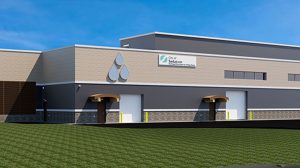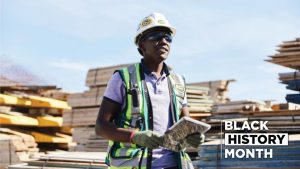As a builder, PCL Construction is accustomed to delivering measurable results on every construction project. The company’s commitment to sustainable development and lowering its carbon footprint is no different — environmental policies must outline specific goals, deliver measurable results and continuously improve to reflect new information, technology and best practices.
“It aligns with our corporate culture,” says Scott Beckman, director of sustainability at PCL. “Our leadership expects us to demonstrate how each sustainability initiative we propose is beneficial and provides the greatest environmental impact for the resources we invest.”
PCL adheres to a “5P” model of sustainability, a holistic approach to construction that includes:
- Partners: Collaborating as client-focused solution providers to deliver exceptional results to all stakeholders;
- People: Engaging employees by providing education, resources, and support;
- Projects: Involvement in all phases of a project’s life cycle before, during, and after its construction;
- Practices: Improving operations through measurement, communication, and integration of sustainable building practices; and
- Places: Contributing to, collaborating with, and improving the places where PCL operates.
“This model gives us a 360-degree view of everything we touch,” says Beckman. “We remain vigilant so that we’re cognizant of our responsibility and our impact for each of those 5Ps. Assessing and processing that information allows us to deliver on projects while evolving our best practices.”
How does that model translate to policy on a practical level?
PCL is currently completing its first corporate greenhouse gas (GHG) emission inventory to provide a measurable contribution to Canada’s 2030 GHG goal of reducing those emissions by 30 per cent relative to 2005 levels.
“It will give us the numbers we need so that we can set objective goals to lower our carbon footprint and know when we’ve achieved them,” says Beckman.
PCL is also updating its corporate waste diversion program to reflect the latest in best practices.
“We’ve always pushed the envelope on waste diversion, especially on those projects designed to achieve a certain sustainability target,” says Beckman. “This will be far more comprehensive and will allow us to determine how we’re doing on all of our projects across the board.”
PCL’s Job Site Insights™, the company’s purpose-built cloud-based construction management application, is also helping to maximize sustainability.
“We used Job Site Insights™ on SKY Residences in the Stantec Tower in Edmonton over the past winter to significantly reduce the amount of temporary heat used on the project,” says Beckman. “Over that one season we saved $250,000 in energy costs. We also saved $175,000 in avoided rework as compared to similar Edmonton projects, by using temperature, humidity and flood-detection sensors. We avoided pipes freezing, and eliminated the flooding and humidity problems that can cause damage to floors and woodwork that creates the need for rework. Reducing the consumption of energy and materials is sustainability in action.”
PCL’s adherence to Lean construction practices is also paying sustainability dividends.
“Lean is a methodology that focuses on maximizing value and minimizing waste, from project conception to final product,” says Beckman. “That includes reduction in time waste, process waste, and material waste. There’s a lot of intersection between Lean and sustainability. We have our own internal Lean group that focuses on setting up our projects from the earliest stages, and they’re integrating sustainability into that process from the start.”
Becoming more environmentally sustainable isn’t only the right thing to do, it’s what customers, both public and private, are demanding in increasing numbers. As a green project leader, PCL has developed the internal resources, expertise and processes to deliver LEED projects, for example, with greater efficiency.
“The efficiency we bring to the table allows us to offer innovative green building techniques to clients who might not otherwise have considered them,” says Beckman.
As part of its strategic plan, PCL is also working with its procurement and resources department to fine tune decisions that will have a greater impact on sustainability. That includes carefully assessing building materials and systems not only on how they perform, but what they contain, how they were made and how they will eventually be disposed of.
“We’re also looking at our supplier relationships,” says Beckman, “For instance, we’re engaging in discussions about our rental agreements for jobsite trailers. We rent and deploy about 3,900 trailers per year. We’re asking if we can make them more efficient, better insulated or solar powered. It’s just one purchasing decision that can have a big impact on our sustainability goals. As a large customer, we can provide the financial incentives for our suppliers to switch to more sustainable alternative products.”
PCL considers not only the type of building or infrastructure it hands off to a client, but the future of that project—how much energy it will use during its lifetime, when early intervention will extend its life, how long it will last, and how it will eventually be deconstructed and recycled. Its Job Site Insights™ platform can help clients to adopt smart building solutions so they can manage energy use and monitor building performance from handover through the full life cycle of the building.
“As Canada’s largest contractor, we feel we have a responsibility to break new ground on sustainability,” says Beckman. “We have the knowledge, the resources and the drive to evaluate and test new technologies and practices at scale. That ultimately brings down the cost of those solutions. As an early adopter, it allows us to bring along our partners and trade contractors and ultimately the industry in general. As a construction leader, our actions definitely have an impact.”
This content is sponsored by PCL Construction in collaboration with ConstructConnect™ Media. To learn more about PCL, visit www.pcl.com. To learn more about PCL’s commitment to sustainable construction, visit www.pcl.com/Culture-and-Community/Our-Commitment/Green-Sustainable/Pages/default.aspx.






Recent Comments
comments for this post are closed